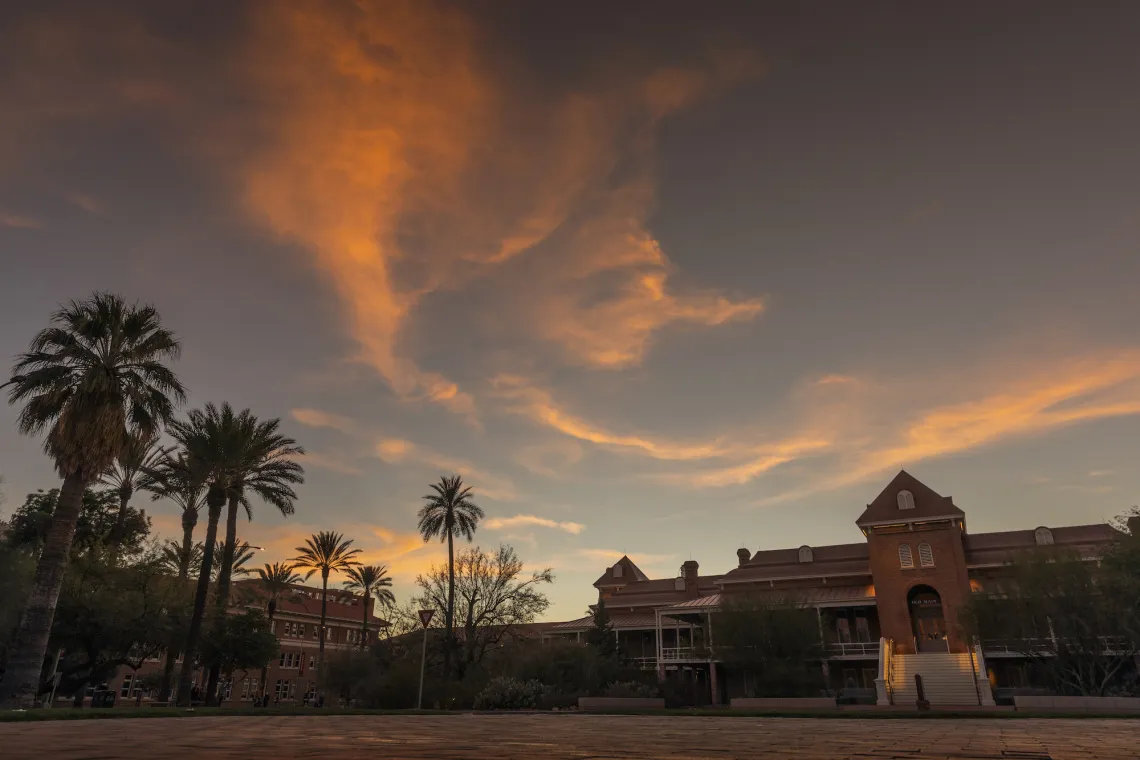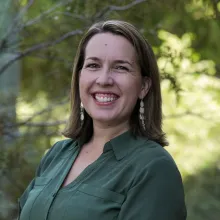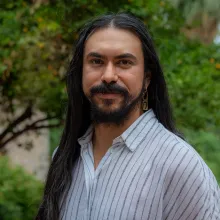Nearly $4M in federal grants will help UArizona institute expand resources for LGBTQ+ youth
Two federal grants will help the university's Southwest Institute for Research on Women expand mental health services and sex education designed to serve LGBTQ+ youth.

Old Main Building, University of Arizona
A pair of federal grants totaling nearly $4 million will help a longstanding University of Arizona research institute expand programs that support LGBTQ+ youth in Southern Arizona.
The university's Southwest Institute for Research on Women received the two grants, both from the Substance Abuse and Mental Health Services Administration, an agency within the U.S. Department of Health and Human Services.
One grant, for $2.5 million, will over the next five years fund Spectrum+, building upon previous SIROW programming, which provides sexual health education, HIV and hepatitis testing and HIV prevention navigation. The program also helps connect participants to mental health services and treatment for substance abuse and other disorders.
The other grant, for $1.2 million over the next three years, will support SIROW's Family Pride Initiative, which provides mental health services to LGBTQ+ youth, as well as training for parents, counselors and others who provide care to LGBTQ+ youth.
Founded in 1979, SIROW is a research institute based in the College of Social and Behavioral Sciences whose mission involves addressing social inequities and public health issues to improve the well-being of women, girls, the LGBTQ+ community and other diverse groups.
Courtney Waters is an associate research social scientist who oversees much of SIROW's sexual health programming, including Spectrum+ and Family Pride. Both projects aim to raise awareness for LGBTQ+ youth in Southern Arizona that there are mental health and sex education resources available that are designed for them.

Courtney Waters
"If these projects can help create public spaces and environments where people just feel safer existing and being themselves, that would be huge," Waters said.
Spectrum+
The funding for Spectrum+ will allow the program to provide comprehensive sex education, testing for HIV and hepatitis C, and screening and treatment for substance use disorders and other mental health-related disorders.
The program focuses on LGBTQ+ youth of color between the ages of 12 and 24. Data from the Kaiser Family Foundation show Arizona was ranked 11th in 2020 for HIV diagnoses. The Arizona Department of Health Services in 2022 reported that people between the ages of 20 and 24 had the second-highest incidence rate of HIV – 20.4 per capita – among other age groups in the state in 2021.
The previous Spectrum project reached 380 people from 2017-2023. Project leaders hope to serve about the same number under the new grant.
The program is run in collaboration with the Southern Arizona AIDS Foundation, which provides HIV testing services and care for those who test positive, and El Rio Health, which will provide screening and treatment for mental health services and substance use treatment. SIROW staff will provide sex education programming alongside SAAF staff and will also evaluate the program as it progresses.
The partnerships reflect SIROW's longstanding approach to programming, which often involves partnering with local organizations that can bring the services to community members and evaluating the reach and impact of those services.
Those evaluations are key in strengthening the relationships organizations such as SAAF have with the communities they aim to serve and addressing any gaps in services, especially for the queer and transgender communities, said Jackson Wray, a senior instruction specialist at SIROW. Wray has worked on SIROW grants in previous jobs with local nonprofits and now coordinates Spectrum+ programming.
"SIROW is definitely the glue – the research or the blueprint is being produced by SIROW while including experts that are in the community and have relationships with the people SIROW is trying to reach," Wray said.
The program will use two LGBTQ+-affirming sex health education curriculums developed by SIROW researchers. Beyond comprehensive sexuality topics, the curriculums offer a sense of pride, inclusion and community for LGBTQ+ participants.

Jackson Wray
"There's a lens shift when we feel included, and I think the curriculum can offer that engagement," Wray said. "If that lands for folks, then I think that's a massive success."
Family Pride Initiative
Through the Family Pride Initiative, SIROW staff provide counseling and other mental-health resources to LGBTQ+ youth. The program also trains parents, teachers, foster-system professionals and other caregivers to provide mental-health support tailored to issues and risks common among LGBTQ+ youth.
SIROW staff will also partner with SAAF on the Family Pride Initiative to help reach potential clients through SAAF's programs and events.
Program leaders will also conduct outreach with the Arizona Department of Child Safety and the local juvenile court system to reach youth and their families who may need these services.
"The grant validates the work that SIROW's been doing for the past 20 years, and that it really has positively impacted our community," said Shannon Fowler, direct service co-project director for the Family Pride Initiative. "But we still see this specific topic as a gap."
The initiative aims to address a common experience among LGBTQ+ youth and young adults, Fowler said, of feeling rejected by family members for their sexual or gender identity. In many cases, this can lead to family separation and even homelessness – an issue that SIROW has long worked to address, Fowler added.
"There wasn't really anything to help families before they get to that point," she added. "We're focusing on the preventative side of supporting families and youth in their situation now instead of having to experience all of those things."
With the new funding, Fowler and Waters say they hope the initiative can reach 120 youth and 50 family caregivers each year for the next three years, and to also train at least 600 providers, which include counselors, juvenile court system staff and other professionals.
The funding will also allow SIROW to establish a LGBTQ+ Youth and Family Advisory Workgroup, a 10-member group that will meet throughout the course of the grant to track the initiative's goals and progress. The group will consist of LGBTQ+ youth, caregivers of LGBTQ+ youth and professional care providers, along with other community members.
Russell B. Toomey, a professor in the John and Doris Norton School of Human Ecology, in the College of Agriculture, Life and Environmental Sciences, will help lead the advisory group alongside SAAF and SIROW staff. Toomey serves as content expert on the initiative.
The initiative will use the AFFIRM curriculum, and SAAF will provide the training as part of its partnership in the initiative.
"If anyone who comes across these projects can come away with a few resources in their back pocket that they can share with someone else, I think that's a success," Waters said. "If people know how to navigate and collect resources that they can call upon as resources change, I think that's important."
##
Media contact
Kyle Mittan
News Writer, University Communications
mittank@arizona.edu
520-626-4407
Researcher contact
Courtney Waters
Southwest Institute for Research on Women
cwaters2@arizona.edu

